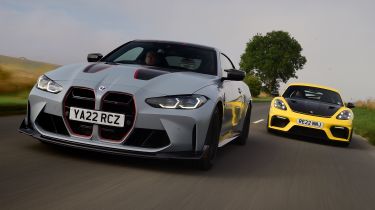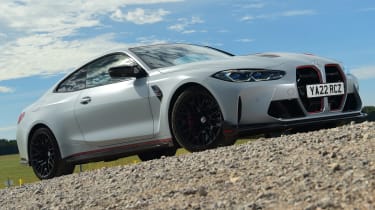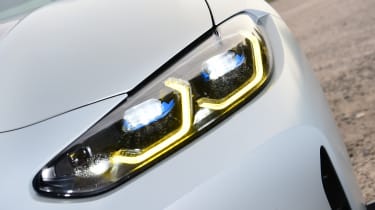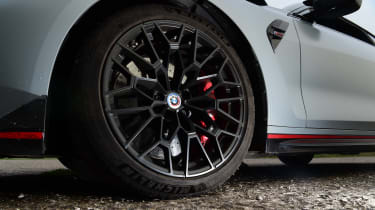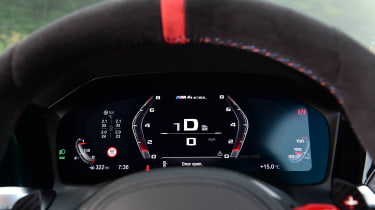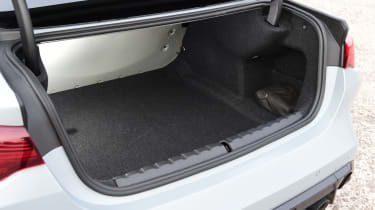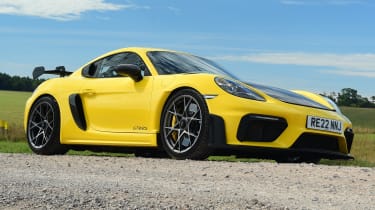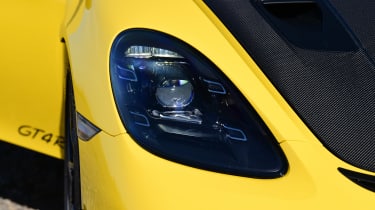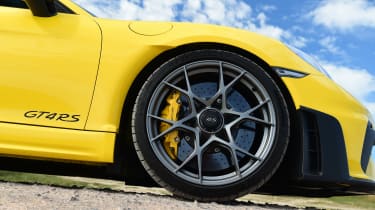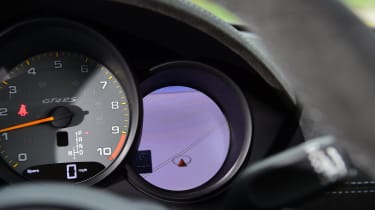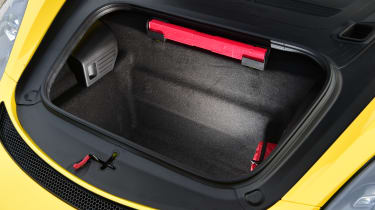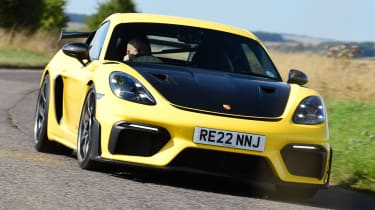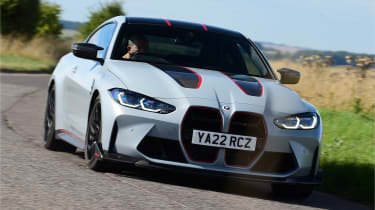BMW M4 CSL vs Porsche 718 Cayman GT4 RS: 2022 twin test review
Focused BMW M4 CSL takes on the razor-sharp Porsche 718 Cayman GT4 RS in a battle for track-day supremacy
CSL: three letters guaranteed to get the pulse of any die-hard BMW fan racing. The E9 CSL “Batmobile” from the early seventies and the 2004 E46 M3 CSL are two of the brand’s performance icons, models that turned already staggering performance machines into some of the most thrilling and desirable models the company has ever built. And now the CSL badge is back.
It returns on the M4, representing the most extreme, most powerful and most focused version of the current G82-generation model we’ve yet seen. So can it live up to the reputation of its predecessors? More importantly, how does it compare with its contemporaries?
Porsche isn’t short of an iconic badge or two, and here we’re pitching CSL against RS – Cayman GT4 RS, to be precise. As with BMW, the company has taken an already impressive sports car as a starting point before its engineers left no rose joint unturned in the pursuit of producing a rare and truly special performance weapon.
Here we have two of the best driver’s cars of the modern era going head to head. This is going to be very special.
BMW M4 CSL
At £128,225, the M4 CSL costs nearly £46,000 more than the standard M4 Competition, a car that’s not exactly cheap to start off with. So what do you get for roughly the price of a BMW M240i on top – and is it worth the premium?
Used - available now

2022 Mercedes
EQA
21,343 milesAutomaticElectric
Cash £23,800
2022 Mercedes
CLA
88,049 milesAutomaticPetrol1.3L
Cash £19,300
2024 BMW
M135i
29,519 milesAutomaticPetrol2.0L
Cash £24,487
2022 Audi
A4
37,569 milesManualPetrol2.0L
Cash £15,887Design & engineering
The ‘L’ in CSL stands for lightweight, and while the car’s price is nothing of the sort, you’re paying for the fitment of plenty of weight-saving components.
Among the biggest savers are the carbon-shelled bucket seats, which weigh 24kg less than the M4’s standard items. The rear seats are removed completely, too, saving 21kg, while carbon-ceramic brakes, lightweight wheels (19 inches up front, 20 inches at the rear) and lightened suspension components trim 15kg, reducing unsprung weight in the process.
Another 15kg is lost with the removal of sound deadening, while 11kg is saved with carbon-fibre components, including the bonnet, boot and roof. The detailing then starts to border on the nerdy.
A further four kilos are saved with the titanium exhaust system, while detail changes to the climate control, kidney grille and lighter tail-light clusters trim another four kilos. However, despite those changes, the CSL is hardly a featherweight, at 1,625kg.
Still, BMW has turned to the engine to liberate more shove, too. As well as the new exhaust, the two turbos run at increased pressure, which, along with tweaks to the engine management, allow the 3.0-litre straight-six to produce 543bhp, 40bhp more than the standard M4 Competition. At 650Nm, maximum torque is the same, while rear-wheel drive is the only drivetrain configuration available with the CSL.
From the driver’s seat, there’s not a huge amount of difference between the CSL and the standard M4. The carbon-backed seats that are optional on the regular version are standard here, and as ever, the central hump in the base cushion, which is meant to hold your thighs in place, is in the way for anyone who chooses to brake with their left foot – certainly worth bearing in mind if you’re a trackday driver.
We need to point out that, due to unpredictable weather leading up to our shoot, our test car was fitted with Michelin Pilot Sport 4 S tyres. They’re still excellent, but a little less focused than the track-biased Pilot Cup 2 tyres that are also available.
Driving
Initial impressions of the M4 CSL reveal that it doesn’t feel significantly different to the standard model. Drive it gently and it feels just as easy to live with; the ride is fairly compliant, as long as you keep away from the harshest Sport Plus mode. Those fat tyres, plus a little less insulation, mean that road noise is fairly pronounced, but it’s still less noisy than the Cayman here. It’s supremely stable at high speeds, too, so it’s a fantastic long-distance cruiser.
Peel off the motorway to find a more winding road, and the CSL has clearly dialled the sharpness up a notch from the standard M4. There’s only a hint of body movement, but it’s just enough to play with the weight transfer through a corner; turn in on the brakes and you can feel the nose tuck into the apex, or squeeze the throttle a little more aggressively, and the back end squirms as it hunts for traction.
One of the CSL’s highlights is undoubtedly those carbon-ceramic brakes. The initial bite is very sharp, so they take a little getting used to, but once you’re dialled in, their power is simply astonishing. The feel under foot gives you huge confidence, while full-power stops on track reveal both incredible stability – even when trail braking into a tight turn – and a dogged resistance to fade.
It’s just a shame that one or two areas don’t quite live up to the brakes’ sharpness, though. When pushing on, the car’s front end feels almost floaty, a symptom caused partly by a level of play in the bushings which just isn’t present in the Porsche.
It’s also a result of the steering. Yes, there’s a touch more detail than in the standard M4, but the CSL still doesn’t quite have the feel or precision to give you the ultimate confidence when pushing on.
It’s a minor complaint, but one which isn’t present in the Porsche, or even BMW’s own M5 CS, so we were hoping for similar here. There’s no doubting the M4’s speed, though.
Practicality
In standard form, the M4 is a practical car that’s easy to use every day. The same applies to the CSL – as long as you’re only intending to travel two-up.
Still, the cargo net that you get in place of the rear bench lets you hold coats, soft bags and the like securely. Pop the CSL’s lightweight bootlid and there’s a generous 440 litres of storage.
Ownership
In the event that the phenomenal brakes and grip aren’t enough to get you out of trouble in an emergency, the M4 is still a safe place to be. The BMW 4 Series was assessed by Euro NCAP in 2019, and it earned a full five-star rating, including an outstanding 97 per cent score in the adult occupant protection category.
Less impressive was BMW’s dealer performance. In our latest Driver Power satisfaction survey, its UK network ranked 15th out of 16 overall.
Running costs
Not many prospective buyers of either of these cars are going to worry about money too much, but at 22.9mpg, the GT4 RS proved to be slightly more economical than the CSL, which achieved 21.8mpg.
While the M4 was some way off its official WLTP figure of 28.5mpg, the Porsche actually exceeded its own claim (21.4mpg). Both cars climb closer to 30mpg on a motorway cruise.
Tester’s Notes: “This M4 is fitted with a special BMW roundel to celebrate the 50th anniversary of the M division. It’ll be a rare, 2022-only extra, and it costs £300.”
|
Model: |
BMW M4 CSL |
|
Price: |
£128,225 |
|
Engine: |
3.0-litre 6cyl twin-turbo, 543bhp |
|
0-62mph: |
3.7 seconds |
|
Top speed: |
190mph |
|
Test Economy: |
21.8mpg/4.8mpl |
|
CO2: |
225g/km |
|
Annual road tax: |
£520 |
Porsche 718 Cayman GT4 RS
It might seem bizarre to even suggest that Porsche’s most extreme 718 looks like good value, but at £113,700, it undercuts the starting price of the M4 CSL by £14,525. Add the optional Weissach pack, which includes a titanium roll cage, six-point seatbelts, and carbon finishes for various parts inside and out – most notably the bonnet and side intakes – and the price climbs to £124,886.
Design & engineering
In isolation, the Cayman GT4 is already a fascinating engineering spectacle, but upgrading it to full-blown RS spec lifts things to almost race car-like extremes.
From the off, the RS sheds 35kg from the GT4, courtesy of a bonnet and wings that are made from carbon fibre-reinforced plastic, a lightweight rear window and less sound insulation inside. That means there’s a kerbweight of 1,490kg, which is a significant 135kg less than its rival here. Opt for the magnesium wheels – a £10,521 extra – and you can knock another 10kg off that number.
The new exterior panels form part of an extreme aerodynamic package. A deep front splitter, air intakes in place of the usual rear windows and the striking swan-neck wing contribute to a 25 per cent increase in downforce when compared with the GT4.
The GT4’s big brother, the 911 GT3, gets an advanced double-wishbone suspension system up front, but that’s not present here. However, the MacPherson strut layout all-round features motorsport-spec rose joints in place of every bushing – sacrificing a little refinement for greater precision.
As you’d expect from Porsche, the engine is a flat six – but while it matches the GT4’s 4.0-litre capacity, it’s unrelated to that unit. Instead, the RS uses the same motor as the 911 GT3, detuned slightly to make 493bhp at a heady 8,400 rpm, plus 450Nm at 6,750rpm. Both figures – especially torque – are down on the M4 CSL’s, but the Cayman’s lower kerbweight means a power-to-weight ratio of 348bhp per tonne – 14bhp per tonne more than the BMW.
Power is sent to the rear wheels through a seven-speed gearbox, which can be controlled with paddles behind the wheel. Alternatively, shifts can be operated by pulling the dashboard shifter – pulling back to shift up, forwards to shift down – and whose design mimics the shape of a manual gearlever.
The rest of the cabin feels truly exciting, too. It’s stripped back just enough to give you a hint of the performance; the steering wheel is simple and lovely to hold, and the seats hold you firmly in place.
Wherever you look, then, the specs of the GT4 RS read like those of a race car.
Driving
With that in mind, it’s no surprise to discover that it often feels like a race car, too. It takes all of 20 yards of driving the Porsche to reveal just how much more focused it is than the CSL. It’s as if a layer of cotton wool has been lifted off all of the major controls; everything, from the steering to the body control, are superbly taut and free of slack, bristling with precision and feedback.
At low speeds, the GT4 RS’s ride is busy – perhaps too much so for some – and there’s not a huge amount of travel in the suspension, so below 20mph, occupants are jostled about. Cambers in the road are followed gently, too, but without any unpleasant tugging of the wheel – just enough to make the car feel alive.
Raise the speed, and it’s as if the Porsche’s suspension relaxes, and everything starts to flow beautifully. The specific spring, damping and anti-roll bar settings for the RS work together to leave absolutely no doubt about what reserves of grip and traction are still to be exploited. The answer is almost always plenty, once the tyres warm up. The balance is sublime; it feels neither clumsy over the front axle nor twitchy towards the back, and the steering feels much more natural than the BMW’s.
Unlike the M4, which feels incredibly effective but ultimately leaves you feeling a little detached from the action, the GT4 RS makes you work for its performance, and ultimately leaves you feeling like your ability makes the difference.
Practicality
Storage is certainly more of an issue in the Cayman than it is in the M4. Still, it’s more than good enough for a long weekend or track day. The front boot holds a modest 125 litres, while Porsche says that the space behind the seats holds another 136 litres. There’s not too much storage elsewhere, but there are pop-out cup-holders in the dash, and a storage bin between the front seats large enough for a smartphone.
Those seats hold you in beautifully, but if you’re a shorter driver, squeezing in between the sloping door pillar and the heavily bolstered seat is quite tricky.
Ownership
Porsche was rated the best manufacturer in our 2022 Driver Power owners’ satisfaction survey – a brilliant result that is highlighted even more by the fact that BMW owners ranked the brand just 15th overall.
An unlimited-mileage warranty also beats its rival here; the M4 comes with 60,000 miles of cover. Both warranties last for three years.
Running costs
If you’re lucky enough to be on the waiting list for either of these cars, we’d encourage you to keep hold of them for a very long time, because they are both going to be highly sought after by collectors.
After three years, the BMW is expected to hold on to 58.2 per cent of its original value, while the Porsche is predicted to maintain 65.9 per cent. Despite the big difference in price between the two initially, the Porsche’s stronger residuals mean that it’ll be worth more than its rival in three years.
Testers’ notes: “The Cayman’s engine makes 10bhp and 20Nm less than the same unit in the 911 GT3. The engine layout and more restricted exhaust system are to blame.”
|
Model: |
Porsche 718 Cayman GT4 RS |
|
Price: |
£113,700 |
|
Engine: |
4.0-litre flat-six, 493bhp |
|
0-62mph: |
3.4 seconds |
|
Top speed: |
196mph |
|
Test Economy: |
22.9mpg/5.0mpl |
|
CO2: |
229g/km |
|
Annual road tax: |
£520 |
Results
First place: Porsche 718 Cayman GT4 RS
It’s hard to know where to start with the superlatives for the 718 Cayman GT4 RS. For many, the glorious noise of the flat-six engine will be worth the asking price on its own, but its response and the gearbox are just as impressive. Then there’s the chassis, which is at least as spectacular as the powertrain. It’s an instant performance car icon, and one of the greatest of the breed we’ve ever driven.
Second place: BMW M4 CSL
It takes a very special car to beat the M4 CSL, but that’s exactly what it has faced up to here. In isolation, the BMW is incredibly fast, thrilling and fun to drive, but beside the Porsche – or even compared with some of the M Division’s past hits – it doesn’t feel as sharp or as raw as we’d have hoped. It remains practical and refined, but that’s not enough to justify the higher price.
Other options for similar money
New: Audi R8 V10 Performance RWD
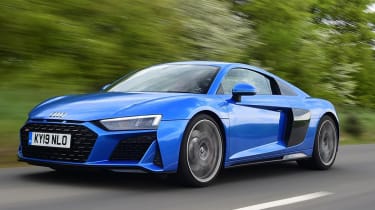
- Price: £129,725
- Engine: 5.2-litre V10, 562bhp
It lacks the track focus of the Cayman or M4, but the R8 is a bona-fide supercar. It’s stunning to drive on road or track, and thanks to its glorious naturally aspirated V10 engine, it’s one of the few cars on sale that can match the Porsche for aural drama.
Used: Nissan GT-R Nismo
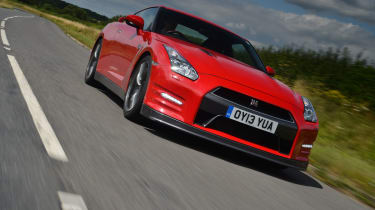
- Price: £122k (’15/15k)
- Engine: 3.8 V6TT, 591bhp
Just as with the BMW and the Porsche, the already potent GT-R was transformed into a fiercely capable performance car. It’s seven years old, but its trick four-wheel drive system will allow it to monster either of our challengers on track.
Figures
|
Porsche 718 Cayman GT4 RS |
BMW M4 CSL | |
|
On the road price/total as tested |
£113,700/£124,886 |
£128,225/£131,770 |
|
Residual value (after 3yrs/36,000) |
£74,951/65.9% |
£74,601/58.2% |
|
Depreciation |
£38,749 |
£53,624 |
|
Annual tax liability std/higher rate |
£2,275/£4,550 |
£9,380/£18,759 |
|
Annual fuel cost (12k/20k miles) |
£3,869/£6,448 |
£4,064/£6,773 |
|
Insurance group/quote/VED |
47/£3,000/£520 |
49/N/A/£520 |
|
Cost of 1st/2nd/3rd service |
N/A |
£1,973 (5 years) |
|
Length/wheelbase |
4,456/2,482mm |
4,794/2,857mm |
|
Height/width |
1,267/1,822mm |
1,386/1,921mm |
|
Engine |
Flat-six/3,996cc |
6cyl in-line turbo/2,993cc |
|
Peak power/revs |
493/8,400 bhp/rpm |
543/6,250 bhp/rpm |
|
Peak torque/revs |
450/6,750 Nm/rpm |
650/2,750 Nm/rpm |
|
Transmission |
7spd auto/rwd |
8spd auto/rwd |
|
Fuel tank capacity/spare wheel |
54 litres/repair kit |
59 litres/repair kit |
|
Boot (front/rear) |
125/136 litres |
N/A/440 litres |
|
Kerbweight/power-to-weight |
1,415kg/348bhp/tonne |
1,625kg/334bhp/tonne |
|
Turning circle |
10.4 metres |
12.2 metres |
|
Basic warranty (miles)/recovery |
3yrs (unlimited)/3yrs |
3yrs (60,000)/2yrs |
|
Driver Power manufacturer/dealer pos |
1st/N/A |
16th/15th |
|
NCAP: Adult/child/ped./assist/stars |
N/A |
97/83/93/72/5 (’19) |
|
0-62mph/top speed |
3.4 secs/196mph |
3.7 secs/190mph |
|
Auto Express econ. (mpg/mpl)/range |
22.9/5.0/272 miles |
21.8/4.8/283 miles |
|
WLTP combined |
21.4mpg |
28.5mpg |
|
WLTP combined |
4.7mpl |
6.3mpl |
|
Actual/claimed CO2/tax bracket |
285/299g/km/37% |
299/225g/km/37% |
|
Airbags/Isofix/park sensors/camera |
Yes/£126/r/yes |
Yes/no/f&r/£2,950* |
|
Auto box/lane keep/blindspot/AEB |
Yes/no/no/yes |
Yes/yes/£2,950*/yes |
|
Climate control/cruise |
Yes/yes |
Yes/adaptive |
|
Leather/heated seats |
Part/£0 |
Yes/yes |
|
Metallic paint/LED lights |
£2,273/yes |
£695/yes |
|
Keyless entry & go/sat-nav |
No/yes |
£350/yes |
|
Digital dash/DAB/connected services |
No/yes/yes |
Yes/yes/yes |
|
Wireless charge/CarPlay/Android Auto |
No/yes/no |
£2,950*/yes/yes |
